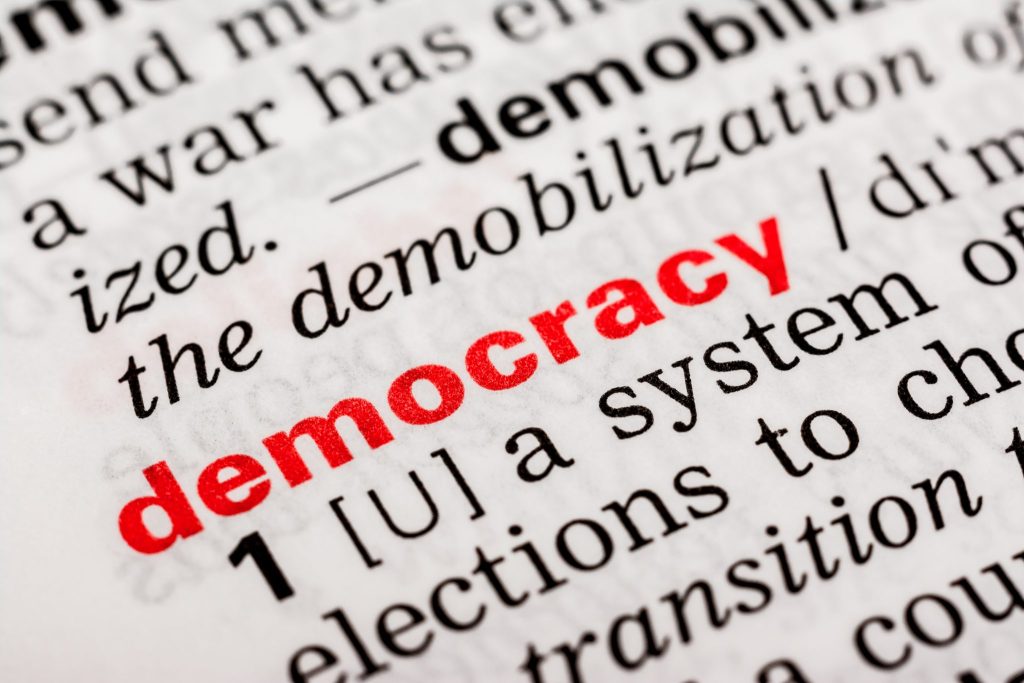Our world is continuously moving in the direction of digitalization, creating an “e-democracy” more intertwined with technology. The interconnection between democracy in the digital age is transforming how elections are held. This marriage has revolutionized the electoral landscape by providing a new platform for political dialogue, voter education, and election monitoring. Yet, it has also come with its risks of election vulnerability. Our article will examine these aspects by dissecting the fundamental challenges to electoral integrity arisingfrom the use of digital technologies and outlining practical steps for safeguarding democracy and fair elections.
Core Principles for Democratic Freedom Online
Digital domains have become the new battlegrounds for civil societynationwide, democratic advocates, and oppressive governments across the globe. United Nations has recognized the internet as a pivotal element to exercising human rights, including the right to freedom of opinion and expression. However, there lies the challenges to democratic values online, ranging from hate speech and disinformation to internet shutdowns.
Defending Digital Democratic Values Against Fundamental Challenges
Digital threats in the form of hate speech and propaganda have become major challenges to human rights and democratic societies, particularly so in the digital sphere. State resources are often used to propagate hate and false narratives, thereby intimidating civil society and silencing the opposition. These threats may include increased surveillance, internet shutdowns, or legal restrictions on freedom of expression. Acknowledging these risks, the Kofi Annan Foundation and various other human right organizations across the globe have been actively advocating against these challenges to electoral integrity.
Balancing Free Speech and the Fight Against Disinformation
Ensuring a balance between protecting freedom of speech and combating disinformation is a significant challenge. The unrestricted spread of disinformation on social media platforms raises severe concerns about the quality of political debates and the potential manipulation of public opinion for political ends. It is crucial to work on policies that restrain hate speech and disinformation without undermining the democratic value of free speech. Civil society actors and entities like the UN have a role in exercising oversight over the digital platforms where such issues often arise.
Press Freedom: A Digital Guardian of Democracy
Freedom of press remains one of the pillars of a vibrant democracy, even more so when challenges to democratic principles extend to the digital realm. Press acts as a watchdog, scrutinizing governments and holding them accountable. However, in the digital age, they are prone to government pressures, discrediting and surveillance. So, safeguarding this principle would mean that press freedom should be ensured online as well as offline.
Online Election Interference: A Threat to Public Trust
Real threats to democratic elections arise from external state actors exploiting digital technologies to interfere in the democratic processes of other nations. These manipulations can cause significant damage to democracy by undermining trust in democratic institutions. Recognizing these dangers is fundamental to preserving the integrity of digital elections.
Exploring Election Vulnerability in the Digital Age
Our election vulnerability index points to a startling rise in adversarial interferences, including cyberattacks on electoral infrastructure, disinformation campaigns aimed to sway voters, and hacking of political parties. These invasive actions rightly trigger alarms, indicating the need to understand and prepare for these novel risks.
Election Watch: Research and Methodology
Freedom House, Kofi Annan Foundation, and other watchdog entities rely on extensive research and methodologies to monitor elections in this digital age. They work to ensure free and fair elections by documenting threats to electoral integrity and advancing democratic values.
Understanding the Impact of the Digital Age on National Parliaments
The digital age has had a profound impact on legislators around the globe. It has offered new platforms for political engagement and has necessitated new forms of regulation. But the rise of the digital age has also created new threats to legislators, including targeted disinformation campaigns, online harassment, and personal data leaks.
Strengthening Democracy with Information, Collaboration and Regulation
To safeguard democracy in a digital age necessitates a multi-dimensional approach, combining information, collaboration, and regulation to form a robust democratic construct resilient to interference. Advancing democracy, therefore, involves collaborative measures by the local and international community, including civil society, the media, and E-democracy activists.
Advancing Democracy: The Key Takeaways
Advancing democracy in the digital age requires acknowledging and addressing these challenges set by the digital era: Developing sound guidelines to promote transparency and accountability on digital platforms, encouraging ethical behavior in the digital political arena, and intensively promoting digital literacy. Advocacy for these and constant vigilance will reduce vulnerabilities and strengthen democracy.

Future Advocacy and Response to Digital Challenges for Democracy
Emphasis should be on proactive change, building resilience, and constantly evolving to address digital challenges. Investments in election security must become a core national security issue. Similarly, civil societies around the world must put their weight behind the advocacy for digital rights and lead conversations about the balance between security, privacy, and freedom in the digital age.
Navigating Democracy in the Digital Age: Resources and Inquiries
Responding to the challenges and potentials of the digital age, many resources have emerged to help stakeholders navigate this complex landscape. Internet platforms of Freedom House, Kofi Annan Foundation, United Nations, and other likeminded entities provide valuable information, research, and policy and practice guidance.
Protecting Your Privacy While Enhancing User Experience
As we navigate through this digital landscape, ensuring privacy is instrumental. Cross-functional teams across companies team up to optimally protect users while enhancing their digital experience. However, it is also critical to ensure that no adverse side effects creep in that might jeopardize the democratic values we cherish.
In conclusion, the digital age has indeed come with great challenges. While technology does not stand still, democracy is not static either; we must continuously strive to keep our democracies resilient. This includes understanding the impact, potentials, and vulnerabilities that the digital age brings along. It is a collective effort that must involve all stakeholders, both local and international. The Kofi Annan Foundation has been at the forefront, along with several other entities, of these efforts. With collective action and a commitment to safeguarding our democratic values, we can ensure free and fair elections and a robust democracy in the digital age. Thank you for reading this article. If you found this article insightful, we appreciate it if you could pass it along and say, “Thanks for sharing.”

